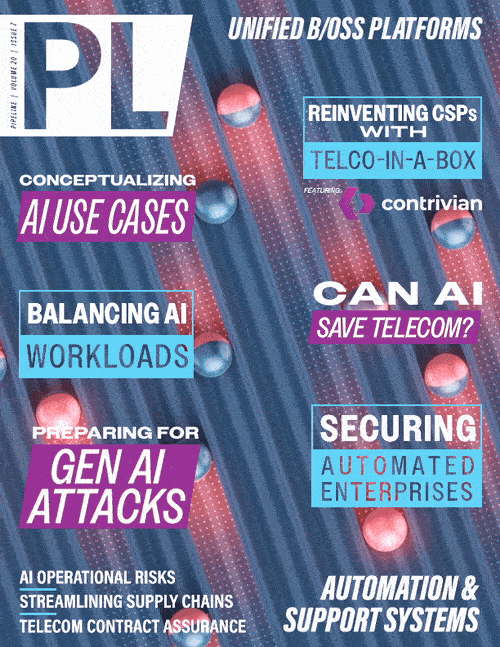Can Generative AI Become the Saviour
of the Telecoms Industry?
By: Justin Paul

At this year’s Mobile World Congress, it was clear that artificial intelligence, AI, was the hottest topic in the industry right now, leaving cloud, non-terrestrial networks, quantum computing, private 5G and even 6G “in the dust.” However, can the industry make the leap from using AI to improve productivity to making AI a major revenue stream?
There is a need for the industry to transform itself and move the major players from telcos to techcos to enable them to benefit from all the new opportunities linked to AI and other emerging technologies. The GSMA predicts that the telco industry will be worth $1.5 trillion by 2030, but that AI technologies will contribute a massive $15 trillion to the overall global economy by the same time.
Predicting the future can be incredibly difficult. In this article, however, we summarize viewpoints from a number of industry leaders on why they believe that telcos (and the wider telecoms industry) should be part of the AI race.
Where is AI Today?
Kathleen O’Reilly at Accenture reminded us that AI isn’t new to the telecoms industry as a whole and that Generative AI (GenAI) is only the latest development in a continuum which started with “Diagnostic AI,” and then “Predictive AI.” Diagnostic AI is used throughout network operations today to improve network performance, carry out root-cause analysis, and other complex operational analytical functions. Predictive AI takes a forward-looking approach to analysis and can be used to understand and prevent future events. A good example would be understanding when a customer calls or messages a contact center what they are calling about or how likely they are to want to cancel their service. This can be used to improve customer experience (CX) and retention within the industry.
Accenture believes AI will contribute 10 percent top-line growth, and 70 percent of IT organizations will be impacted by GenAI. They also state that 95 percent of workers believe that GenAI can improve work, but don’t trust the technology. Ultimately AI will have a huge impact on the industry, but there are also major trust issues about its implementation. The following are industry viewpoints about AI from leading companies in the field:
SK Telecom: the Rise of Telco LLMs
South Korean operator SK Telecom’s Chief AI Officer, Mr. S G Chung, spoke about the two key methods in which AI would impact their business. Firstly, AI is a key tool for improving cost efficiency. With saturated markets globally and limited revenue growth, a focus on the reduction of operating costs is obviously a key focus for many CSPs. SK Telecom believes that AI, and in particular GenAI, can be a key driver for contact center efficiency. The ability to accurately record and summarize conversations with customers, provide guidance, and resolve complaints, not only offers the opportunity to reduce OPEX but also to improve customer experience. Secondly, they see GenAI driving new business models using AI assistants.
SK Telecom highlighted that for them a key tool to drive this transformation is the introduction of a telco-specific Large Language Model (LLM), and to this end they announced the formation of the Global Telco AI Alliance with DT, Singtel, e&, and Softbank collaborating to create their own telco LLM looking to accelerate the use of AI within the industry. They believe that this telco LLM will deliver improved AI performance (accuracy), improved time-to-market, and optimized cost-effectiveness. They also believe a telco-specific LLM is better able to address the needs of the industry than some of the generic LLMs used today.
Ericsson: Open, Programmable High-performance Future Networks
Elena Fersmann, VP and Head of Global AI Accelerator, took a slightly different view regarding the role of AI in networks of the future. She pointed out that both Diagnostic and Predictive AI are already ubiquitous lower in the technology stack, and that GenAI is harder, but not impossible, to deploy at the network level. However, the Ericsson view is that in the future AI plus Network plus Cloud will be an unstoppable combination in delivering the open, programmable, high-performance networks upon which we will rely. Achieving this in reality will require 1) trustworthy AI, 2) flexible models, and 3) ecosystems and partnerships capable of delivering specific use cases.
One of the challenges noted by a number of organizations talking about AI is the need for partnerships and ecosystems, and unfortunately the generally poor track record within the industry, particularly with CSPs, of successful partnering models.
BT: Unlocking the Human Potential of AI
BT Group’s CDIO and Vice-Chair of the TM Forum, Harmeen Mehta, took a very “bullish” outlook regarding the short-term impact of AI on their business. She noted that BT already has 90 percent of
their data in the Google Cloud (GCP) and that they expect AI to provide a 25 percent productivity increase by 2026, valued at over £170



















